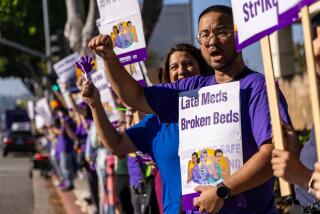Nurse, Bed Shortages Close 13 Emergency Rooms in Area
- Share via
Shortages of nurses and beds forced administrators at 13 San Fernando Valley area hospitals to close their emergency room doors to patients requiring acute care during the weekend, leaving other facilities struggling to cope with the overflow.
Paramedics were warned that critically ill or seriously injured patients would not be admitted to the overcrowded emergency rooms, even if they were the closest facilities to the patients. Emergency patients who came to hospitals on their own were not denied treatment, however, administrators said.
“Medical gridlock”--rashes of emergency rooms closing at the same time, leaving paramedics spinning their ambulance wheels waiting for empty beds to deliver patients--has hit Los Angeles County hard. The problem is particularly severe in the inner city, where many hospitals, unwilling to absorb the cost of treating patients too poor to pay, have closed emergency rooms or cut back emergency services.
Emergency care in the Valley has not reached the critical condition of downtown and South-Central Los Angeles, but the problem is spreading. Unlike inner-city hospitals, which usually close because they lack space for patients, Valley hospitals often close with intensive care unit beds empty.
Too Few Nurses
“I don’t have the nurses to take care of the patients. It’s not due to saturation--a lack of beds--it’s a lack of nurses,” said Chester Wheeler, nursing supervisor at Valley Presbyterian Hospital in Van Nuys, which closed Saturday and Sunday.
Valley Presbyterian closed with nine of its 23 intensive care unit beds empty because only seven nurses in that unit were available to work, Wheeler said. Normal staffing for the unit is 11 or 12 nurses.
Similarly, Humana Hospital West Hills closed all day Saturday and most of Sunday with beds open in its 16-bed intensive care unit.
“We exhausted our nursing supply and none were available from the nursing registry,” a temporary nursing service, said Greg Potenza, the hospital’s public relations director.
Panorama Community Hospital in Panorama City closed its doors Saturday “because we had no nurses to care for any more patients even though there was maybe a bed or two empty” in the hospital’s 10-bed intensive care unit, said nursing supervisor Milo Huempfner. “It’s increasingly a problem.”
Other Options
Nursing, once one of the few careers open to women, has declined in popularity among females as other professional opportunities have opened to them, nursing supervisors said Sunday. The percentage of men entering the field has not increased correspondingly, however, creating a tremendous shortage of nurses throughout the medical world.
“Enrollment in nursing programs has declined markedly because women have chosen other career fields and men haven’t been actively recruited,” Huempfner said.
When nurses do complete training programs, they often choose not to work for hospitals, lured to home health agencies, medical equipment companies, attorneys or private companies by higher salaries and better benefits and hours. The impression that hospitals “traditionally have catered to physicians and not nurses” further deters nurses from working there, Huempfner said.
But Valley hospitals, particularly smaller ones, do sometimes close their emergency rooms because they have filled each bed for critically ill patients.
As hospitals close units for lack of nurses or beds, others strain to take up the slack, creating jams in their emergency rooms.
“When other hospitals are closed, that puts a strain on the entire system. It impacts us a lot,” said Holly Lyons, nursing supervisor at Holy Cross Medical Center in Mission Hills, which was open most of the weekend. “And it’s a heck of a big deal if you are the patient. Instead of being five minutes from emergency care, you might be 10 or 15 minutes from emergency care.”
Under such circumstances, a walk-in patient with less serious problems must often wait for hours to be seen by a doctor, Lyons said.
Although Lyons said that emergency room closures in the Valley seem to have increased dramatically in the last six months, she said that she does not believe the Valley’s problem is a consequence of the emergency care shortage downtown.
“We don’t get a lot of crossover. Not that many patients are coming up in this direction,” she said. “Most of my patients are coming from the immediate vicinity.”
Changing Definition
Instead, Lyons said, increased closures are a result of the nursing shortage, an over-reliance on emergency care and a changing definition of what constitutes an emergency.
Larger hospitals are not immune to the problem, either. Judy Kuble, nursing supervisor at Northridge Hospital Medical Center, which has one of the Valley’s biggest emergency rooms, said it was closed to emergency patients last Monday through Wednesday and part of the day Friday. “If you don’t have R.N.s to take care of patients, you can’t stay open,” Kuble said.
Other hospital emergency rooms that were closed over all or part of the weekend were Encino Hospital, Granada Hills Community Hospital, Henry Mayo Newhall Hospital in Valencia, Kaiser Permanente Hospital in Woodland Hills, Valley Medical Center in Van Nuys, North Hollywood Medical Center, Pacifica Hospital in Sun Valley, Medical Center of Tarzana, Olive View Medical Center in Sylmar and Westlake Hospital in Westlake Village.
More to Read
Sign up for Essential California
The most important California stories and recommendations in your inbox every morning.
You may occasionally receive promotional content from the Los Angeles Times.













